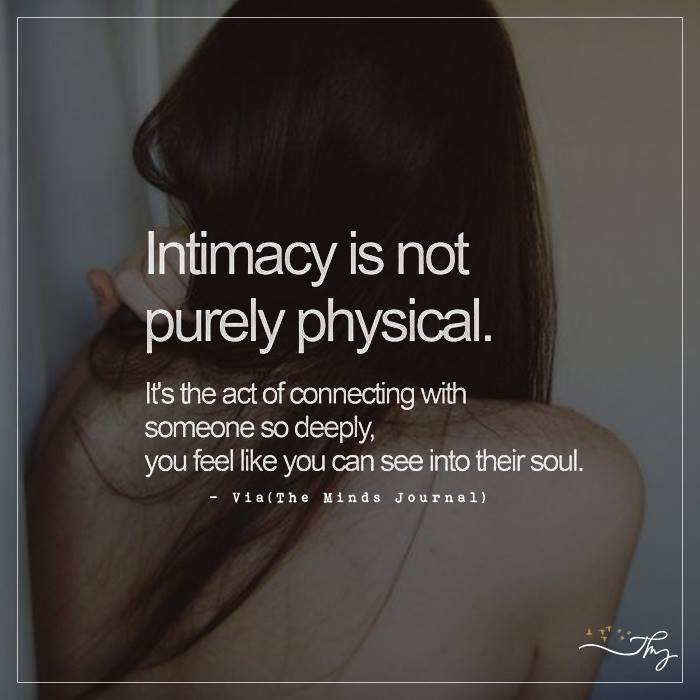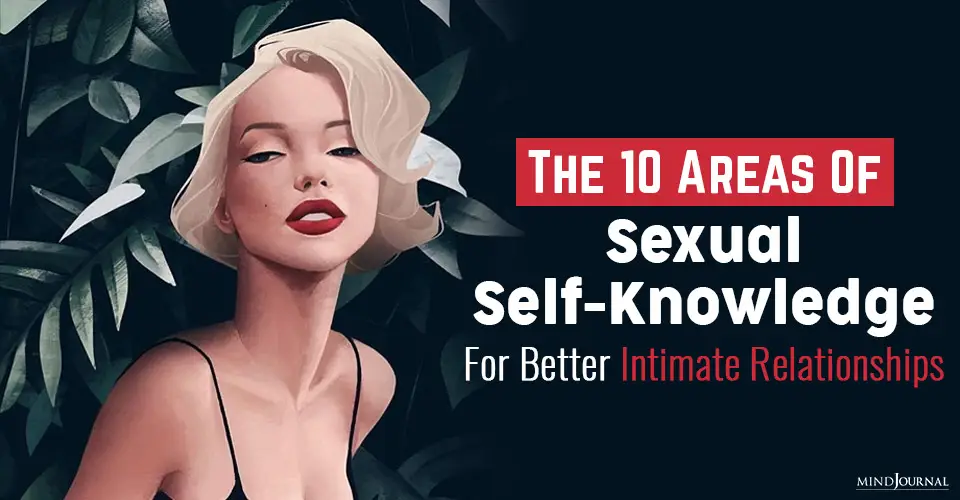Does owning your sexuality make your relationship with yourself and your partner stronger? Well, sexual self knowledge is the key to building and enjoying intimacy with your partner, and understanding the concept and importance of sexual self-knowledge can really help both of you in the long run.
When people come into couple’s therapy, they are usually very willing to talk about most subjects. Whether communication problems, unexpected losses, financial disputes, or other issues, they are open to sharing those kinds of concerns.
The one issue that is often the least likely to emerge without deeper prompting is the way they feel about themselves or the other person sexually. They can talk about surface problems like differences in appetite or loss of desire, but not about how they actually feel about themselves as sexual beings.
When I more deeply inquire, it becomes very clear how many intimate partners have withheld much of their sexual histories, traumas, fantasies, insecurities, and discomforts with one another. Or even from themselves.
Being a trained sexual therapist as well as a psychologist, I know how important it is for every person to both understand his or her core sexuality as well as to be comfortable enough to share it with a trusted partner.
In hopes of making the process easier for my patients, I share with them the following 10 most important components of sexual self-awareness. As they explore these concepts both individually and together, they are often able to achieve a stronger and more satisfying sexual relationship.
Owning your sexuality: The 10 Areas of Sexual Self Knowledge
1) Taboos.
Taboos are forbidden behaviors that can be proscribed by society, religion, or families of origin teachings. They are often passed down from generation to generation, unchallenged in their original form.
Because they are transmitted when people are young, they are often deeply ingrained. When sexual desires overrule their suppression, the people participating are likely to feel guilty, humiliated, and remorseful.
Taboos more than likely would not exist if people would suppress those behaviors without them. Societies that are uncomfortable without those restraints, therefore, super-impose them to ensure they will not happen, no matter whether they might be harmful or helpful.
“I used to be told if I talked about my sexuality in any way that we wouldn’t have a tennis tour.” – Billie Jean King
Related: How Female Sexuality Changes During Her Life
2) Anxiety.
Most every person suffers some anxiety around their sexuality and its manifestations.
My patients often tell me that they are concerned about body image, timing, touch, sharing their desires, being rejected, or being seen as not measuring up to their partner’s expectations.
Most sexual partners are uncomfortable sharing those anxieties with a new partner and may even have withheld them from their long-term committed ones. Instead, they rely on just watching, noting, assuming, and adapting to what they think their partners will want and enjoy, rather than just asking them directly.
3) Hidden Desires And Fantasies.
Sexual desires are formed and often set in the early years of sexual awakening when masturbation is often the most achievable outlet. There are no outside people to observe, so those desires can develop privately.
As they mature, the internal sexual world expands from exposure to media, friends, education, and actual partner experiences. Even with all of that cumulative knowledge, many adult partners still feel too uncomfortable to talk about those original private fantasies and how they have developed over time.
If people take the risk of sharing what internally arouses them but are sadly rejected or humiliated, they may bury them even more deeply and strive to get those needs met in more indirect or strategic ways.
“Sexuality is one of the ways that we become enlightened, actually, because it leads us to self-knowledge.” – Alice Walker
4) Access To Accurate Information In Childhood.
Families accept or reject children’s inquiries about sex from total acceptance and support to complete suppression. Much depends on how comfortable they are with their own sexuality, and children pick up those feelings.
The level of openness and the willingness to give accurate information sets the foundation for a child-turned-adult to be more able to openly communicate their sexual feelings to their partners.
Because sexual attitudes are learned so young by teaching and modeling, the way one partner accepts or rejects the other’s attempt to emotionally and physically connect is deeply affected by these early teachings.
Related: 13 Science-Backed Reasons For Physical And Sexual Attraction
5) Prior Sexual Experiences.
So many people tell me separately about their prior sexual experiences but do not feel comfortable sharing them with their partners. They may feel embarrassed by something they’ve done, humiliated by something they allowed to happen to them, traumatized by events that still hurt, or fearful they might not be seen in a positive light if they share them.
Particularly in the case of negative events, or times when they were perhaps naïve, selfish, or ill-equipped, they don’t trust that their partners would find them as attractive were they to know what happened in the past.
Most everyone has had some negative sexual experience at some time in his or her life. It is crucial that partners accept, support, and reciprocally share negative memories with one another if they can.
6) Romantic And/Or Pure Lust Sex For Its Own Sake.
Romantic, in-love sex is usually the most physically and emotionally satisfying for intimate partners, but everyone I’ve ever talked to either wonders about or participates in many kinds of sexual encounters as well.
Pornographic websites are among the most searched online by both men and women. Sexual curiosity is normal and healthy and many people watch porn to virtually experience what could be too uncomfortable to actually pursue.
Yet, many couples do not share those internal interests or desires with each other if they feel the other partner would be shocked, uncomfortable, or condemning. They tell me privately that they fantasize about those thoughts and feelings while having sex with their partners but don’t necessarily reveal them.
That does not imply that people should share everything they feel internally or that it is wrong with maintaining privacy if that is what a person wants. But, the more two people can share, accept, and support those internal worlds, the closer they become.
“Sexuality is, of course, a great way of having a conversation between people.” – Tilda Swinton

7) Physical Health.
Like any physical and emotional exercise, sex is always better when the participants are robust, energetic, and agile. Tired, stressed, conflicted, or emotionally distressed people cannot be at their best sexually.
New lovers tend to put anything they can on the back burner, and, making their sexual connection a high priority. They want to look and be at their best and work hard at it.
Sadly, as people are together for a while, those commitments often take a back burner and can easily fall into a predictable routine unless they prioritize their sexual connection.
There are, of course, extenuating circumstances for many. Illness, children, family problems, financial worries, etc., can put a downer on any kind of pleasure, sex often being the first thing that suffers. But, even if a couple sets aside quality time once in a while to reconnect in a meaningful way, they can still make it work when they do.
Related: 5 Things That Make Men Feel Sexually Desired
8) De-Mystifying Myths.
Every generation and every gender have sexual stories that are believed as facts when they simply are not. The naïve or unexamined acceptance of these myths can strongly affect sexual behavior.
For example, there are still actually young men who were told that they might go blind or lose their capacity for sexual functioning if they masturbate too often. Or that they will not be able to perform on an athletic field if they have sex that morning.
Yes, only about 30 percent of women orgasm vaginally, and the absence of being able to have an orgasm without clitoral stimulation does not signal that they are somehow lacking. And, you can get pregnant while menstruating, get an STD from oral sex, and can have an intact hymen even if you are no longer a virgin.
It is crucial for every sexually active man and woman to actively educate themselves about what is true and what is not. And then to liberate themselves from mythology that unnecessarily suppresses sexual expression.
9) Double Standards.
It still continues to surprise me when I hear a couple talk about what might be okay for one of them but never for the other, or that one partner’s reasons are more legitimate than the others.
Society’s teachings are the most powerful contributor. The media routinely demonstrates which gender is able to do what and when, and why that is, or is not, acceptable. There are also power differentials, available options, personal values, cultural expectations, biases, and condemnations. All of those contribute to a difference in behavioral acceptability.
“Sexuality is one of the biggest parts of who we are.” – Carla Gugino
10) Trauma.
There cannot be enough written to emphasize the effect of sexual trauma on the ability of its victims to be sexually healthy in the aftermath of these violations. That is especially true when children are used that way. Those that have had repeated sexual violations learn that helplessness and submission in the face of boundary violation is the only option.
But I have also had patients of both genders who have been assaulted as adults. They, too, suffer from the symptoms that trauma creates. If added to childhood victimization, the summation is often crucial.
It is very difficult for those harmed by sexual abuse to trust that any partner who desires them will not also take advantage of them in some way. They often expect that a current lover will transform at any moment into an abuser.
Though the sharing of one’s internal sexual world is important to all couples, the ability to share trauma is crucial to healing the past. Current partners can be trained to not trigger the prior anguish and to offer new ways to help a prior victim find pleasure without the expectation of harm.
Related: 15 Signs Of Child Sexual Abuse: Understanding The Dynamics Involved
The more open and honest sexual partners can be with each other about who they are and what they need, the better a sexual relationship can become. It is only when intimate partners are willing to know and accept themselves with self-honor and respect, that they can offer that beloved self to another.
If you are feeling shy in owning your sexuality and expressing your sexual desires in front of your partner, here’s an advice- DON’T. There is absolutely no shame in being unapologetically yourself in your relationship. Sexual desires are as normal as they come. Own your sexuality with confidence.
Written by Randi Gunther Ph.D. Originally appeared in Psychology Today










Leave a Reply
You must be logged in to post a comment.